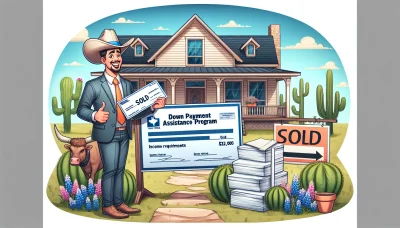Government loans to buy a house Quiz
Test Your Knowledge
Question of
Understanding Government Home Loans
Types of Government Home Loans
-
FHA Loans: Benefits and Eligibility
FHA loans are insured by the Federal Housing Administration and are designed for low-to-moderate-income borrowers. They require lower minimum credit scores and down payments than many conventional loans.
-
VA Loans: Understanding the Advantages for Veterans
VA loans are provided by the U.S. Department of Veterans Affairs for active-duty military members, veterans, and their families. They offer benefits such as no down payment and no private mortgage insurance.
-
USDA Loans: Financing Rural and Suburban Homes
USDA loans are issued by the United States Department of Agriculture and are meant to help buyers in rural and suburban areas with no down payment required and lower interest rates.
How to Qualify for a Government Loan
-
Credit Score Requirements
Government loans have varying credit score requirements, with some programs accepting scores as low as 500 with additional conditions.
-
Income and Employment Verification
Applicants must provide proof of stable income and employment to qualify for a government home loan.
-
Down Payment and Mortgage Insurance
While some government loans require no down payment, others may require a down payment. Additionally, some loans require mortgage insurance.
The Application Process for Government Loans
-
Gathering Necessary Documentation
Applicants need to gather necessary documents such as proof of income, employment verification, and credit information.
-
Finding Approved Lenders
It's important to find lenders approved by the government program under which you're applying for a loan.
-
Timeline and Steps to Approval
The process can take several weeks to months and involves steps such as pre-approval, home inspection, and final approval.
Benefits of Government-Backed Mortgages
-
Lower Down Payments and Flexible Terms
- Comparing Down Payment Requirements
- Interest Rates and Loan Terms
- Government Guarantees and Their Impact
-
Assistance for First-Time Homebuyers
- Special Programs and Grants
- Educational Resources and Counseling Services
- Building Credit for Mortgage Approval
-
Refinancing Options with Government Loans
- Streamline Refinance Programs
- Cash-Out Refinance Possibilities
- Refinancing for Home Improvements
Navigating the Housing Market with Government Loans
-
Finding the Right Property
- Working with Real Estate Agents
- Identifying Eligible Properties
- Assessing Property Value and Condition
-
The Role of Appraisals and Inspections
- Understanding Appraisal Requirements
- The Importance of Home Inspections
- Dealing with Appraisal and Inspection Issues
-
Closing the Deal on Your Government-Backed Home
- Understanding Closing Costs
- Finalizing the Loan Agreement
- Moving into Your New Home
Overcoming Challenges in the Home Buying Process
-
Dealing with Competitive Housing Markets
- Strategies for Making Competitive Offers
- The Importance of Pre-Approval
- Patience and Persistence in House Hunting
-
Addressing Credit Issues Before Applying
- Identifying and Resolving Credit Report Errors
- Improving Your Credit Score Over Time
- Alternative Solutions for Credit Challenges
-
Handling Rejection and Next Steps
- Analyzing Reasons for Loan Denial
- Improving Your Application for Future Attempts
- Exploring Other Financing Options
Financial Planning for Homeownership with Government Loans
Budgeting for Mortgage Payments and Homeownership Costs
- Estimating Monthly Mortgage Payments
- Planning for Taxes, Insurance, and Maintenance Costs
- Creating an Emergency Fund for Unexpected Expenses
Long-Term Financial Considerations
- The Impact of Mortgage Duration on Finances
- Building Equity Over Time
- Considering Future Selling or Renting Scenarios
Saving for a Down Payment and Closing Costs
- Effective Saving Strategies
- Programs to Assist with Down Payments
- Budgeting for Closing Costs
Legal and Regulatory Aspects of Government Home Loans
Understanding Mortgage Regulations and Compliance
- Key Federal Mortgage Regulations to Know
- Staying Informed About Changes in Laws
- The Role of the Consumer Financial Protection Bureau
Navigating Fair Housing and Anti-Discrimination Laws
- Recognizing Fair Housing Rights
- Reporting Discrimination in the Home Buying Process
- Ensuring Equal Opportunity in Housing
Environmental Regulations and Property Standards
- Environmental Assessments for Property Eligibility
- Meeting Government Standards for Property Conditions
- Handling Properties with Environmental Concerns
Preparing for the Future as a Government Loan Homeowner
Maintaining and Increasing Home Value
- Regular Maintenance and Upkeep
- Renovations That Add Value
- Energy Efficiency Upgrades
Strategies for Paying Off Your Mortgage Early
- Additional Payments and Their Effects
- Refinancing to Shorten Loan Terms
- Financial Planning for Early Payoff
Transitioning from Homeownership to Selling
- Preparing Your Home for Sale
- Understanding Capital Gains Tax Implications
- The Process of Selling a Government-Backed Property












